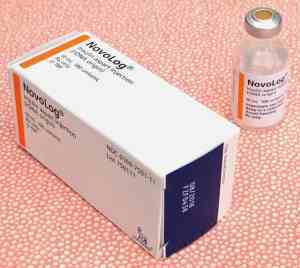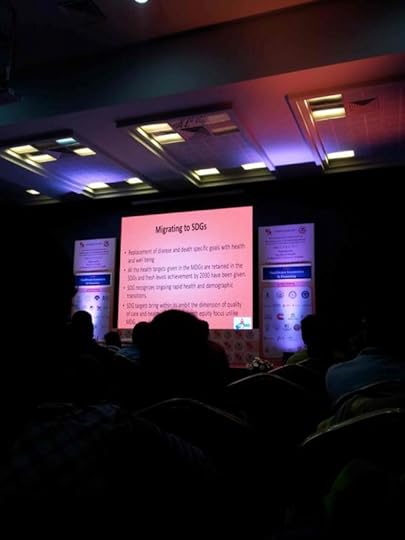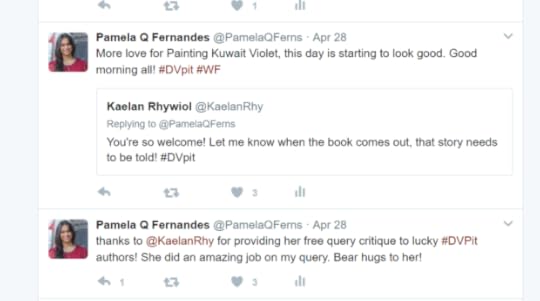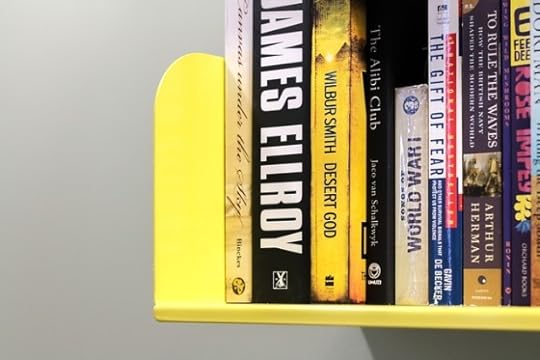Pamela Q. Fernandes's Blog, page 33
May 19, 2017
QMC 8 – Help, My patient is freaking out over package inserts!
Package insert causing mayhem! Haha.

Package Insert: Legal Requirement for all drugs
It’s weird how this question came in. Dr. MC, says, “My patient was prescribed textbook medications for his condition. He’s read the package insert and he’s freaking out. How can I convince him that this is what’s best for him!”
Why is this question weird, you ask? Because as of this week, I’m teaching students how to create and write package inserts and patient information leaflets.
If you’ve seen most package inserts, they are scary. Long page, fine script, lots of don’ts and negative stuff. A good package leaflet is usually neutral but that’s not what we’re discussing.
If you’re faced with a similar situation, then see below:
1.Make time
When dealing with patients who come back waving the leaflet, you must prepare to spend some time with these guys. Even if it means keeping them till the very end. You can’t just shoo em in and out. Give them your time and attention.
2. Listen to what they’re saying
Often they will have questions that are justified. “Doctor does this drug really thin my blood?” Listen to their questions and write it all down. Maybe they’re scared of the side effects(usually the case) or maybe they’ve read what the leaflet is also prescribed for, “But Doc, it says here this is also given to patients who had a heart attack. I didn’t have a heart, did I? Will I have one soon?” Just listen. Don’t wait to bombard them with your explanation. Once you listen, wait, pause for dramatic effect. Let them know this isn’t new information for you. You know this stuff. Just because they’re new at it, doesn’t mean you are. Give them the sense that you have a handle of the drug and it’s effects. And if you don’t give the leaflet a cursory look.
3. Explain the risk/ benefit ratio
Ideally, you should be explaining this to your patients BEFORE you prescribe. For me, no matter what I’m prescribing, I always take 20 seconds to tell the patient of potential side effects. Not only does it make me look smart (wink), but it also tells my patient that I’m truly concerned about them. And that at the first sign of something going wrong, they must notify me.
Also make it very clear, “If you don’t take this medicine, what’s the alternative? The drug is meant to thin your blood, because otherwise it has a propensity to clot. Your tests, X and Y have proven so.” Explain that this is the standard treatment. If you know the statistics then mention that as well. Justify everything you’re doing.
4. Be Honest
Don’t lie. If the insert says that dizziness could be a side effect, then agree that it can be a potential side effect. Don’t lie and say “These things really don’t happen.” Patients won’t believe you.
5. Stress the importance of the Package Insert
The Package Insert was created to inform the public. Establish with your patient that all drugs are chemical molecules that have effects. The drugs have been studied and the entire spectrum of side effects is mentioned on an insert by law to inform people of the potential side effects even rare ones. This is usually done so as to prepare people for all eventualities. Don’t tell patients to ignore the Package insert. In fact, encourage them to read and ask you any questions they may have. Often I ask patients to get back to me in a week, by mailing my nurse or phoning in to say they’re doing better or having any effects, just so they know I’m interested in knowing if they’re experiencing any effects.
Take a look at this paper about the effect of a package insert on patients here. Most of the patients who are frightened by them return to their GP’s for a discussion. No Biggie.
Let me know if this worked for you. And other superstar docs out there, do you have a better way of dealing with this. I’d love to know!
The post QMC 8 – Help, My patient is freaking out over package inserts! appeared first on PAMELA Q. FERNANADES.
May 15, 2017
Word Count -Why one size does not fit all ideas?
Word count is one of the guidelines when it comes to publishing. Whether you’re querying or pitching your new project, the word count is going to be key in those discussions.
But as an author how do you know if a particular idea can be a full novel or a novella? How do you decide it can be expanded?
So some rough numbers here:
100-8000 words – Short story
8000- 40,000 words- Novella
Anything over 55,000- Novel (Except for romance, most genres want word count 70,000 and up for a decent novel)
If you’re like me you will have hundreds of ideas in a week. With a fertile imagination comes a glut of ideas. All of those ideas have a story, some conflict and you have to find the resolution. So how do you distill those ideas and set it to a format with a designated word count. You’ve seen I have all sorts of length of work. Fingers crossed that I can get a novel sold. 
May 9, 2017
Author website – Why it’s necessary for every author?

Author website
Why is an author website necessary you ask? Let me tell you exactly why. 
May 8, 2017
Symhealth 2017-Healthcare in a Globalizing world
As you may have seen on social media I was a delegate at Symhealth 2017. It was a conference at Lavale, Pune organized by Symbiosis International University. The theme “Healthcare in a Globalizing world.”
There was plenty on offer in terms of new and fresh perspectives. So departing from my usual QMC posts I decided to share some of the takeaway points from the Conference.

Dr. Soumya Swaminathan at SymHealth 2017 Healthcare
Here’s a list of the speakers (Quite a rockstar line-up):
Dr. Ashok Dayalchand (Director, Institute of Health Management, Pune)
Dr. Nitin Jadhav (Associate Coordinator, SATHI Pune)
Dr. Alok Kumar,IAS (Advisor, NITI Aayog, GoI)
Dr. Satish Kumar (Advisor – Public Health Planning, NHSRC,MoH & FW, GoI)
Dr. K. Srinath Reddy (President, Public Health Foundation of India)
Dr. Gita Sen (Director, R S Centre on Equity on Social Determinants of Health, PHFI)
Dr. Mira Shiva (Founder, All India Drug Action Network)
Ms. Seema Ahuja (Vice President, Biocon, Bengaluru)
Dr. SubbaRao M Gavaravarapu (Deputy Director, National Institute of Nutrition- ICMR)
Dr. Ruchi Jaggi (Director, Symbiosis Institute of Media & Communication, SIU)
Ms. Sushma Kapoor (Vice President, GHS)
Mr. Kumar Ketkar (Chief Editor, Dainik Divya Marathi)
Dr. Pradeep Krishnatray (India- Director, Johns Hopkins Bloomberg School of Public Health)
Dr. Mohan Agashe (Former Director, Maharashtra Institute of Mental Health)
Dr. R. Balasubramaniam (Founder & President ,Swami Vivekananda Youth Movement, Mysore)
Sunita Singh-Dalal (Chair, AC & H Legal Consultants, Dubai)
Dr. Nikhil Datar (Medical Director& Senior Consultant, Cloudnine Hospital, Mumbai)
Prof. Kris Gledhill (Director of Clinical Education, AUT Law School, New Zealand)
Dr. Sanjay Gupte (Past President, FOGSI)
Dr. Santosh Kakade (CEO, Core India Institute of Legal Medicine)
Dr. N. R. Madhava Menon (Chancellor, NUEPA, Delhi)
Prof. John Tingle (Reader in Health Law, Nottingham Trent University, UK
Dr. R. Chandrashekhar (Chairman IGBC, Green Healthcare Ratings)
Mr. Jayesh Dave (Associate GM Architect, Fortis Healthcare)
Dr. Vivek Desai (MD, HOSMAC India Pvt. Ltd.)
Dr. Prashant Jha (Fellowship Director, International School of Biodesign, New Delhi)
Mr. Mohit Malhotra (MD, Stryker India Private Limited)
Dr. B. Ravi (Chair Professor – Mechanical Engineering, IIT-Bombay)
Dr. Nitin Tripathi (Professor, AIT, Bankonk)
Mr. Pranay Goel (Associate Professor- IISER
Mr. Pankaj Kakkar (Director Data Mineria)
Mr. Pankaj Kanchankar (Commercial Director, Satvix Informatics)
Mr. Milind Pol (SVP, Analytics, OHUM Healthcare Solutions Pvt. Ltd.)
Ms. Linda Roberson (CEO, Paper Tracer Software System, USA)
Dr. Anupam Saraph (Future Designer & Growth Strategist)
Maj. Gen. Sanjay Behera (Commandant, AMC Centre & College)
Dr. Khanindra Bhuyan (Health Specialist, UNICEF)
Mr. Suman Billa IAS (Joint Secretary, Ministry of Tourism, New Delhi)
Ambassador (Retd.) Sudhir T Devare (Former Indian Ambassador)
Dr. Roderico H. Ofrin (Regional Coordinator, WHO, SEARO, New Delhi)
Dr. Ajith Kamath (Executive Director, Mitra Biotech Pvt. Ltd.)
Mr. Gautam Morey (MD, Sofomo Embedded Solutions Pvt. Ltd)
Dr. Shirshendu Mukherjee (Mission Director, Grand Challenges India, BIRAC)
Dr. Shyam Vasudeva Rao (MD, Forus Healthcare)
Dr. Purushottam Shiralkar (Consultant, NHS, UK)
Surg. Rear Admiral Dr. V. K. Singh (Retd.) (MD, InnovatioCuris)
Dr . (Sur. Capt.) Kushilab Bose (Chief, Medical Operations, Healthspring)
Dr. B. M. Hegde (Former Vice Chancellor, Manipal University)
Mr. Dileep Kumar (President, Indian Nursing Council)
Dr. R Nagarathna (Medical Director, Arogyadhama, VYASA)
Dr. K. S. Sethi (Deputy Advisor, Homeopathy, GoI)
Dr. N .Srikanth (Dy. Director General, CCARS, GoI)
Dr. H. Sudarshan (Hon. Sec, Karuna Trust)
Dr. Ravi Wankhedkar (President Elect, Indian Medical Association)
Dr. Sanjay Zodpey (Vice President, Public Health Education, PHFI)
Dr Henk Bekedam (WHO Representative to India)
Ram Jeth Melani ( Member of Parliament (Rajya Sabha), Senior Advocate (Supreme Court of India) and an eminent professor of law)

Symhealth 2017 – Integrating Healthcare
Some key points about healthcare in India that I took away from the conference:
Point 1- Universal Health care needs more money and it will be quite some time before India can realize this. (With only 1% of the budget allocated to healthcare and no change on the horizon, it looks gloomy for Indian healthcare.)
Point 2 – India has a long way to go to reduce its Maternal mortality rate (174) and Infant Mortality Rate (45) (Maybe we should ask Sri Lanka how they do it?)
Point 3- There is no one solution to healthcare. (I agree. We should start with basic coverage and gradually move up. But we must start somewhere!)
Point 4- Increased Research in medical schools should be encouraged. (Maybe it should be made part of the curriculum? And doctors in research should be paid significantly more than sweepers)
Point 5- Decentralization of powers and healthcare decisions shifted from Union to State. (These powers should be clearly delineated, so that decision-making ping pong is prevented.)
Point 6 – Social organization in terms of determinants of health should be given special attention. (Education, hygiene, jobs, women’s rights, equal pay, gender inequality-how many years is it going to take for us to pay attention)
Point 7- Tax to GDP ratio has to be raised. (Yes raise taxes for all, not just the working middle class. All unorganized workers in rural areas and everywhere else should pay. If it works in the Middle East, it can work here.)
Point 8- Two aspects should be focused on in universal health coverage ( vertical and horizontal). The vertical growth of healthcare cannot survive if pillars of horizontal growth namely infrastructure is not strengthened. (Strongly agree, the public hospitals are crumbling, where will all these universally covered people go. The current public sector is already stretched.)
Point 9- Public -private health care should be a level playing field. (Contrary to what was said, I think public hospitals need to up their game, instead of saying private hospitals should lower their standards)
Point 10- Migration to SDG’s (Sustainable Developmental Goals) must hit the ground running. (We can’t afford to be sluggish.)
Point 11- Inequality has to be addressed.
Point 12- Strong statements come from the government, but where is the money?
Point 13- More regulation of the private sector. (Agree, You can’t have drug and services priced differently everywhere.)
Point 14- Rajasthan and Tamil Nadu’s case study of making drugs affordable should be emulated by all states. (This was an eyeopener. These state governments did really well in making drugs cheap for their citizens. We should adopt it in all states.)
Point 15- There needs to be coordinated response in a disaster in India. (When I asked about why we’re not investing in civilian disaster preparedness like Japan, it was said that one size cannot fit all. Honestly, we don’t have a civilian disaster preparedness plan. Most of it is a personal responsibility. I wish the government could rope in civilian doctors, nurses and healthcare personnel for this, like they did in the Philippines for typhoons and volcanoes. I remember duties on those days, all hands on deck.)
Point 16- Grants and funding for medical innovations and projects require compelling ideas and a strong application that checks all these criteria: significance, motivation, investigation, approach and environment.
Point 17- Technology is becoming essential to better healthcare. Numerous innovations are changing the way doctors deliver healthcare.
Point 18- The above point also reduces the connect between doctors and patients. (So what do people want more connect with a human doctor or more technology?)
Point 19- Who is to say that tribal medicine and the way tribal people live is not healthy? (This was an excellent talk about why we should allow tribal people to function as they always have without harming their habitats . It was also enlightening how the decisions made at the Center have been disastrous for these people with no oversight about the ground realities on tribal areas.)
Point 20- Doctors are increasingly demonized. (The general tone of the conference was largely anti-physician. There was a lot of hate for doctors. For all the sacrifice, sweat, blood and tears I’ve put into being a physician, I found it disappointing. Well I can only say this to the policymakers; you only reap what you sow. )
In the end, Dr Henk Bekedam, stressed the need for the government to wake up from its inaction and work on strengthening infrastructure while also explaining the basis for universal health coverage. He also moaned the fact that we spend only 1% of our budget on health. (Trivia: Bangladesh and Sr Lanka spend more than us and they’re MMR & IMR are way below ours.)
Mr Ram Jeth Melani, was quite vocal about two things, the rise of ISIS which quite rightly is going unchecked and the inertia over bringing back black money from abroad by the current Indian government. More black money coming to the coffers would mean more for the government to spend on things like healthcare. The man has guts, I have to admit. No wonder he’s such a fantastic lawyer.
Were you at the Conference? Are you planning on attending one this year? Tell me what you learned or plan on learning?
The post Symhealth 2017-Healthcare in a Globalizing world appeared first on PAMELA Q. FERNANADES.
May 2, 2017
Are writing contests worth it?

Why authors participate in writing contests?
I’m not a contest person. I always think I’ll never win anything. But like everything else in life, it’s all about perspective. Four years ago, a new publishing company wanted south Asian writers through an online writing contest and pretty soon, Indireads picked me as a winner for its contest and Seoul-Mates was born.
So writing contests are with their advantages. Not all of them will lead to winning the first prize, but there are indirect prizes. Here are some of them:
-Network – You know when you’ve taken part in a group critique contest or a twitter pitch event, you’ll spend all day watching the feed, interacting with other authors, beta readers, editors, proofreaders. You have no clue who you’ll meet and eventually you do develop friendships with so many others in the same boat. These are cheerleaders. Also your interactions withe editors and agents, build a network of people that are in your industry. When you later meet them at a conference or query them you could always remind them of that brief connection you had.
–New agents- I find new agents through Writer’s Digest. But I realized not every new agent gets spotlight there. Its often the well known literary agencies that get showcased. At contests you find new agents representing a particular category. For example at the recently concluded #DVPit contest on Twitter I found a ton of agents that I can add to my spread sheet although only one wonderful agent liked my pitch. (Fingers crossed) Often MSWL’s stay the same, unchanged for months and so at these contests, agents will put out their own wishlists and it’s wonderful to see an agent who previously didn’t represent something suddenly looking for it. Yay!
-Free critiques and query- Contests can be awesome for this. I consider myself a winner at #DVPit because I got a like from an agent and a free critique by an editor for my query. During the contest an editor decided to offer three authors who received likes, a free query edit. I won one, mainly because I was stalking the feed. Kaelyn, an author and editor herself, was so helpful.

Twitter Contest Feedback
-Revisions- When Miss Snark did her secret agent contests this year. I had a ton of advice given to me from other authors. Though I didn’t win I got a bucket load of advice about my first page, which I very quickly edited. Contests help you revise. You probably won’t see the problems in your writing because you are too close to the subject, but other readers can and they will gladly point it out to you.
-Winner- Winner- You may actually win. Yes you may. If not the first prize, then a runner up prize or an honorable mention. And this is serious moolah. You could use this in a query to tell potential editors or agents, “Look here, I won something. Readers are interested in seeing this published. Often the prize maybe an agent, or a scholarship to a retreat or a critique course. Or a contract. Yipppeee!
Many people are worried, someone may steal their idea. There’s that risk, but often you’re pitching a finished manuscript and have you seen those contest entries. Some of the pitches out there are amazing. Tell me why you do or do not take part in writing contests?
The post Are writing contests worth it? appeared first on PAMELA Q. FERNANADES.
April 29, 2017
EPISODE 6 – Seeking the Holy Spirit’s Guidance in Fellowship
“If you want to experience fellowship, then ask the Holy Spirit to show you and He will.”
In this episode, I talk to blogger and attorney, Maria Garabis Davis about fellowship and what it really entails. She talks in depth about seeking the Holy Spirit’s guidance in experiencing and participating in fellowship.

Maria G. Davis
Maria Garabis Davis holds a Juris Doctor degree and a BA in theology.former youth minister and now a practicing attorney, she is the founder and co-owner of the greeting card company Pio Prints (www.pioprints.com). Maria resides in Columbus, Ohio, with her husband and four children.
Maria answers questions about:
-Why fellowship is important?
-Keeping track of the fine line between concern and intrusion
-The indirect ways of fellowship
-Keeping fellowship still focused on God
-Seeking the Holy Spirit’s guidance through daily prayer.
-The balance between personal life and community fellowship
-If we should advertise it in our own churches.
She also gives practical tips on how working mothers and people with busy lives can contribute to the Church community, by responding to the needs of those around us. One of the things that really touched me was her advice about seeing every person in the pew, next to me as someone with their own struggles and problems. Maria advocates getting involved in the community, while knowing your station and what God is calling you to do every single day to build His church.
You can reach her on Facebook at Maria Garabis Davis or email her mdavis@pioprints.com. You can also check out her post on Aleteia, titled, “Why are Catholics so notoriously bad at fellowship?”
If you liked this podcast, then do share it with your friends, like us on Facebook, tweet it to your friends and email it to those you think will benefit from hearing about it.
The post EPISODE 6 – Seeking the Holy Spirit’s Guidance in Fellowship appeared first on PAMELA Q. FERNANADES.
April 24, 2017
How to tackle ‘Revise and Resubmit?’

How do you go about doing a Revise & Resubmit?
R & R’s or revise and resubmit is what I believe a step up from an outright rejection. It’s where an editor/agent/publisher/ reviews your manuscript and thinks it’s salvageable if you make changes as per their suggestions.
They could be one line suggestions or a boatload of them, but R&R’s are particularly helpful for your manuscript. Because it tells you two things:
A. The manuscript is worth something.
B. What can make it better?
I know it’s heartbreaking to see another rejection, “Sorry, not for me right now, but if you could do/add/subtract/edit…” When you see that but, you can be assured that the editor or agent has seen some diamond within all that carbon spun around it.
I’ve been blessed to have had the opportunity to work with journals and editors where feedback was given on rejections. I’ve had 6 revise and resubmit’s over the last year. One was published, “Where is Ally?” One was sold to another site, “The Last Communication.” One is out with publishers. I’m still waiting to hear detailed suggestions from one, where I’ve been asked to R&R and I’m working on the other two.
First, don’t even debate whether you’re going to follow the R & R. Too many people think that it’s a waste of time. If an editor/agent took the time to make notes and send you an email when they could have simply clicked reject then you should be taking it seriously.
Second, nobody is out to mangle your story. I know this is your baby, you want to dress it, groom it and prime it the way you feel best. But let’s face it, the end goal is to get this story out there. If something has to change, then do it. Don’t complain about the suggestions. You can still “do it your way.”
Different people have different styles of revision, but I’ll tell you how I go about it.
Read, close and vent: This is my usual reaction when I see my edits. My BP climbs and I feel the need to eat lots of chocolate or chips. It hurts. Because not only they did they reject me, but how can they tell me to kill one of my characters. So read your R & R. I would say, give it a glance and set it aside.
Re-read and analyze the notes: After your period of mourning, print out the notes or open it on MS Word and read them. Study them. What are the suggestions? Tone? Plot? Voice? Punctuation? Character development. You will see major issues and then there will be minor ones. Sometimes it could be very general and vague. Other times it will be highly detailed and specific. Make your own notes here. Divvy up the major issues. I usually do this a week to a month after I get my R & R because I like to start fresh with no emotion.
Read your manuscript: As if you’re seeing it for the first time. Yes, read it as if you bought this from a book store/ E-store after having paid 4 bucks for it. Don’t make notes. You will be sorely tempted, but don’t. Just read.
Reader feedback: Once you finish reading, you will beat yourself up as to how you let such dreadful mistakes slip through your fingers. And you passed that slippery manuscript to an editor/agent. How did you not see what the editor/agent saw? Because you know she’s right. Hence the R & R.
Go back to those notes you made and add all the general things you thought was wrong with the book to your R &R notes. Ponder on it. When you’re cooking, cleaning and doing mundane things, think about how you can make it better. Give this a few days to let the ideas brew.
Schedule: Once you have notes on the general stuff, look up the word count. Whatever it is ,divide it by 10. You need to set a daily editing goal. This is very important.
You can change this number to whatever you like, but I like ten, because anything over ten days and I start forgetting what the beginning of my chapter looks like. Heck, I can’t even remember the place. Blue eyes become green and sometimes Bea becomes Lea. Sigh. This is easily possible if you’re handling multiple writing projects at a time.
Re-writing: With a deadline, in mind, you’re truly on your way to R & R. Start editing on a copy of your MS. Don’t use your original. You never know if you will need the extra words from there later or if an agent accepts that version while you’re working on the R & R. I focus on editing chapter by chapter.
Start with the first pages and then build, layer, chop and weave. You may have to add details. You may have to cut out words. For “Where is Ally?” my free story, I was asked to take out 3000 words. Gasp. Yup. And I did. The story is so much better without all that clutter. Whereas for a current manuscript, I’ve been asked to add another 20,000 words. Phew, that’s a lot. Depending on your suggestions work your way through the chapters.
Set aside: After you finish your marathon R&R. Set aside for two weeks, four is better. Put your feet up and forget all about the story.
Re-read: Now re-read your notes and your work. Have some of the major issues been dealt with? Is it revised suitably to the suggestions? Make more notes about the finer problems.
Re-edit: This will go much faster, but edit again in the same time frame, but with the finer points in mind.
Rinse and repeat the last two steps twice and then set aside for two weeks.
Final read/Beta read: Either give to your CP’s or read it yourself before resubmitting.
This takes about 4- 5 months for novellas. If it’s a short story, I’d say two months. Most editors will only accept your work after 6 months of R & R.
By breaking down the work into chapter chunks and making a schedule, you will be able to streamline your R & R’s. Of course, how you do it depends on your individual writing style but this is what helps me best.
What about you? Do you have any neat tricks for tackling R & R’s?
April 19, 2017
QMC 7 What to do if my patient wants to pursue alternative medicine?

What to do if my patient wants alternative medicine?
Dr SF sent in this question. What to do if my patient wants to pursue alternative medicine?
Allopathy is no longer the ONLY succor of the masses. In 2008, approximately 38 percent of adults in the United States aged 18 years and over and nearly 12 percent of U.S. children aged 17 years and under use some form of complementary and alternative medicine (CAM), according to a new nationwide government survey. [1]
This number is much higher now and more in the developing world where Homeopathy, Chinese medicine, Unani and all sorts of alternatives have gained traction.
The first thing you’ve got to understand is that you can’t force anyone to stick with allopathic medicine. Those days are gone. Today the patient makes the decisions for better or worse. Your job is to inform them about treatment options, pros and cons. The majority will let you decide because you know best and most of the time you do. A small minority have read something off the net to treat HIV or watched a late night infomercial to treat cancer and want that.
The second thing is what is this alternative therapy. Supplements, diet based, massage, chemicals, exercise, what is this stuff? I personally do not trust something that comes out of a bottle with no label and that has no research on it. If something goes wrong you need the antidote and if there’s no antidote I’m not recommending it. So, you have to know what exactly this therapy is. Can it be done simultaneously while allopathy is pursued. If its a diet, can a patient still continue anti-hypertensive medications. Is it tai chi or exercise? You need to know, not just the type of therapy but also if this is going to be an ‘either or situation’ or ‘together can’ situation.
The third thing is the primary illness. Is this a serious illness where the patients is going to get considerably worse without medication? For a view of the disastrous consequences of complementary medicine in terminal illnesses read this paper. If it is then there’s no argument here, you can’t recommend something that has not been studied, recommended and scientifically proven over what you know is clinically sound. Especially if this is a life threatening condition with an expiry date looming close.
My take on this:
Listen to the patient: Address his concerns, why is he choosing this over my recommendation of x or y? Is it cost? Is it a lack of trust? I also think that if he’s lost faith in my medicine then he’s lost faith in me as physician. I can say “I’m not familiar with these other types of products,” and leave it at that, but then the patient feels the doctor is not listening or uninterested in what they have to say.
Recommend a second opinion: Sometimes I recommend the patient visit another doctor. Maybe someone else might be able to help him see that pancreatic cancer will not improve with fruit juice. A second opinion can reinforce or steer the patient better as the patient realizes that two people recommending the same thing must be for a good reason.
Read the research: Instead of saying no outright, read about the “new therapy.” That usually arms me with the ammunition to say no. When you say no right off the bat, patients get combative and feel the urge to resist you. Often I get people who want to take a cocktail of something. I write down the name of their wonder drug, and add that to my clinical reading at the end of the day. Then I find out out the dirt. Happily print it and during the next meeting hand it over to the patient, gladly informing him why said drug will not work. If the patient still doesn’t agree, reach for the paper.
Document the decisions: You’ve tried everything, the patient still believes that cupping will heal his ulcer. Write it down. Have the patient sign a letter that he’s doing so against medical advice. Its fine if you just document this in an E.M.R, but for really controversial treatments, you need to cover yourself. Any prosecutor or judge is going to ask you, “But you with all your clinical training, how could you allow this to happen?” Don’t be an idiot. Document it, ad verbatim is even better.
Set a deadline: Keeping in mind the placebo effect, I usually set a deadline. If you’re blood pressure doesn’t come down with fenugreek water in three weeks, its back to the pills for you, sir. Its better than the patient spending endless months on a failed treatment. It also prevents him from going too far off the beaten path. The last thing you want is side effects or multi-organ complications that you have no clue how to treat, because the bottle without a label doesn’t say what’s inside.
Build rapport: Call patients for repeated followups. You don’t want them to slip through the cracks. Sometimes they may be embarrassed they’re new wonder drug, garlic oil is not working, but hey, by showing them you’re there without any judgment takes away the pain of admitting failure. You’re doing your job to make sure the patient is okay.
Reinforce the message: Repeatedly inform your patient at every follow up, the pros and cons, risks and benefits of the medication they’re taking and the allopathic options available to them. It doesn’t hurt to show them what’s still out there.
What do you do? Do you advocate CAM (Complementary and alternative medicine)?
References:
1.Barnes PM, Bloom B, Nahin R. CDC National Health Statistics Report #12. Complementary and Alternative Medicine Use Among Adults and Children: United States, 2007. December 10, 2008.
April 17, 2017
Why authors should research comp titles?

For all of us in the querying business, you’d know that comp titles are important. Comp titles are examples of previously published books that are similar to the one you’re writing or querying.
But comp titles are not just for the querying stage. I believe they’re so much more useful when done right. Here are the reasons why:
Setting up your book: I like to read a few comp titles after I write my first draft. I need to see how my book can be different. Like for Seoul-Mates, a romantic suspense, there were plenty of books with the marriage-of-convenience trope. But I had to set myself apart and that’s where the cultural aspects of Korea came into play. After you read a comp title, make a list of how your book is similar. And then differentiate your work based on that. Agents don’t want to sell the same stuff. They want to know how your book stands apart from the already published crowd.
Weaving your theme: All books have a theme and when you’re going to send your work to a book cover artist, book trailer maker, blogger, marketing department, you will have to provide this. Take a look at this list of themes. Comp titles can be a good way to learn how the theme has to be woven in. Whichever theme you select for your trope, it has to be stitched into the fabric of your story seamlessly. What better way than finding out from published authors? With Under a Scottish sky, I knew there were tons of love stories in Scotland. Its a magical place to fall in love. But my theme was forgiveness and so the story and its characters had to be primed and set up around that. My characters had to have a past that were riddled with mistakes.
Determining the audience: This is so important not just pre-publishing but in post publishing stages as well. Comp titles will tell you what audience will buy your book, who will read your work, where to find these readers, where to advertise, what kind of trailer to create, what merchandise will go with it? If I was re-writing Seoul-Mates for teenagers I would have to create Instagram or Snapchat, but for adults my current social platforms of Facebook and Twitter are adequate. With the audience plenty changes, the vocabulary; the language and even the style.
Evoking tone and style: You also need to study the tone and style of your genre. Be very careful, because sometimes its very easy for another’s tone, voice or style to bleed into your work. Which is why I do this only after I’ve finished my own first draft. You want to keep your voice, but study the tone of the genre or niche in which you’re writing. Maybe the atmosphere from that book is what you want to evoke.
Querying: Many people mention how this manuscript will compare, be better than or similar to a published book in query letters. How to do this? Dan Barlow has some amazing tips on how to select and use comp titles in a query letter. I personally don’t like using Comp Titles. Its three extra lines where I could squeeze more about my book rather than advertise an already published one. Janet Reid says,”But honest to godiva, you can shoot yourself in the foot so easily here I wish you’d believe me when I tell you that you do not need comps if your query is compelling enough.”
What do you think about comp titles?
When do you research comp titles?
Do you have any additional uses for them?
Image: CCO Pixabay
April 13, 2017
Tips from a Freelance Writer

As you know, I occasionally do take on freelance writing work and after a jolting experience with non-payment last week I woke up to the realities of the freelance writing world. Sure, I knew the rules. After a decade in the business I knew the ins and outs. Yet, I flung all common sense out the window and made rookie mistakes, thinking, “Well, I’m a pro now, it won’t happen to me.” But it did and after that I thought of penning this post more as a reminder to myself than advice to others.
Here are the tips I’ve gleaned over the years. You would be wise if you could use all of them.
Always sign a contract – This is a business. Even if its a friend of a friend or a favor, always. I mean ALWAYS, sign a contract. Because without this you’ve got nothing. No matter how well you know the person, sign a contract. For tax purposes, legal and official purposes sign a contract. With a legally binding document, you will be taken seriously as a professional and will be treated that way as well. Get a boilerplate contract and edit it as per your needs. Check out a sample contract from Columbia law school.
Add a late payment fee – I haven’t done this for writing but I’m increasingly leaning towards this. Having this clause in your contract, forces your client to keep cheques and payments ready on the date of delivery instead of after. This prevents any delayed payments and non payments.
Get a Letter of Agreement – A Letter of Agreement is a safeguard more than anything else. It contains details like the exact word count agreed on, dates of deliverables, first drafts and last draft dates, details of assignment and transfer. I think this is great because you have a definite plan of what your job is and what is required of you. See this sample to create your own LOA.
Deposit fee – To deposit or not? This is something that many freelance writers do, especially if you’re working with a new client. When the client has something at stake, (cough- money), then they’re more receptive to queries and emails. And magically all dealings take place above board. The client is more invested because he’s already paid. Most online services are pay first, service later and there’s no harm in this. How much? Not too little as chump change that the client can ignore you and not too large where they question hiring you. I’ve seen as much as 10% to 30%. It depends on you.
Query Sheet – A query sheet is one that a client must fill detailing their requirements. I find this particularly helpful for scientific writing, where the requirements are very specific. Not all clients fill this, because often they’re clueless. But this is important, especially given my last few interactions, where clients send in reams of data with a short note attached, “Thesis.” No kidding.
A query sheet should have certain mandatory details like title, style guide, inference and word count. You can create a detailed query sheet or incorporate it in your contact form, its up to you. A query sheet can cut a few interactions about details as it simplifies and clarifies what the client wants.
Document all communication – This is important, especially when things go wrong. And they do. Often the SPOC( specific point of contact) will be your go between and not the primary decision maker. This person could be HR and is clueless about the project. When things go wrong, the easiest thing is to deflect blame onto the freelance writer. So, document every communication with the client. If its a phone call, follow it up with an email saying, “As per our conversation earlier,blah blah.”I learned this from a previous boss who said, “Document everything.”
Know the hierarchy – This is especially if things have to be escalated. Let’s say you have a deadline, but there’s a problem with the data and you’ve sent three emails but heard nothing back, then what? So write to the next higher up. What if payments are held up, whom do you contact in case of non response from the SPOC, the editor or accountant? It helps to know whose who about the client.
Automate Invoices – I’ve not been in the habit of automating invoices, but I’m slowly converting to cloud accounting. I haven’t used Freshbooks but I’ve heard good things like automatic reminders and alarms thus preventing any guilt about asking for your own money. Creating your own invoices also makes you seem very professional.
Don’t Transfer all files before final payment – I’ve debated this, but after I cried my woes to fellow freelance writers, I was quite sternly told that this is standard practice. The understanding being that the first draft was the blueprint or sample or near finish project while the final draft is the final perfect version. You wouldn’t let someone take a painting home and check if its okay and then pay. You’d take the money and then hand over the project. Everything after that is edits not redoing drafts. Which brings me to my next point.
Limit Edits – Allow a finite number of free edits. Maybe two or three. Once you receive payment and transfer the file, there is no room for redoing the project. This is particularly important where your client is a team. If this team has eleven members and you don’t have a fixed number of edits, then you will find yourself making eleven edits based on each member’s feed back and not all of it will come at the same time. So if you allow a first edit, then a pass, the client is forced to convene a team meeting, identify problems and ask for changes. Then you do your final and last free edit and it goes to the client for a second pass. If they still have more edits, then they need to pay extra. You will find if they have to pay extra they will manage to iron the entire product in those two free edits. It all happens magically
I have to admit, I didn’t do any of these ten things as I was helping a friend of a friend and I sank. Please don’t repeat my mistakes. the above tips will prevent you from sinking in this competitive business.
Do you have any tips for freelance writers? Let me know. I’ve learned my lesson, but I could definitely learn more.



